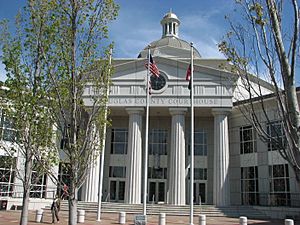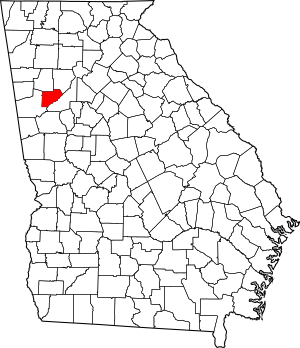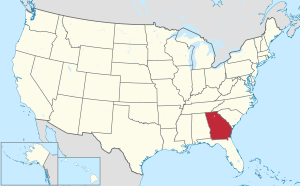Douglas County, Georgia facts for kids
Quick facts for kids
Douglas County
|
|||
|---|---|---|---|

Douglas County courthouse in Douglasville
|
|||
|
|||

Location within the U.S. state of Georgia
|
|||
 Georgia's location within the U.S. |
|||
| Country | |||
| State | |||
| Founded | 1870 | ||
| Named for | Stephen A. Douglas | ||
| Seat | Douglasville | ||
| Largest city | Douglasville | ||
| Area | |||
| • Total | 201 sq mi (520 km2) | ||
| • Land | 200 sq mi (500 km2) | ||
| • Water | 1.0 sq mi (3 km2) 0.5%% | ||
| Population
(2020)
|
|||
| • Total | 144,237 | ||
| • Estimate
(2023)
|
149,160 |
||
| • Density | 721/sq mi (278/km2) | ||
| Time zone | UTC−5 (Eastern) | ||
| • Summer (DST) | UTC−4 (EDT) | ||
| Congressional district | 13th | ||
Douglas County is a county in the north central part of Georgia. In 2020, about 144,237 people lived here. This number has more than doubled since 1990!
The main town and county seat is Douglasville. Other towns in the county include Villa Rica and a small part of Austell. Douglas County is also part of the larger Metro Atlanta area. Many new people have moved here as more jobs have become available in Atlanta.
Contents
Douglas County History
How Douglas County Got Its Name
Douglas County was created in 1870, right after the American Civil War. The state government of Georgia named it after Stephen A. Douglas. He was a senator from Illinois. He also ran for president in 1860 against Abraham Lincoln.
A historical marker in the county tells us:
This county, created by Act of the Legislature October 1, 1870, was named for Stephen A. Douglas, the "Little Giant," a Vermonter who was Congressman from Illinois 1843 to '47, Senator from '47 to '61, and Democratic candidate for President in 1860 on the ticket with gov. Herschel V. Johnson, of Georgia, for Vice President. Among the first County Officers were: sheriff T.H. Sellman, Clerk of Superior Court A.L. Gorman, Ordinary Wm. Hindman, Tax Receiver Jno. M. James, Tax Collector M.D. Watkins, Treasurer C.P. Bower, Surveyor John M. Hughey.
The county was formed from a part of Campbell County. This part was located northwest of the Chattahoochee River. The rest of Campbell County later became part of southwest Fulton County in 1932.
Choosing the County Seat
When Douglas County was first created, voters had to choose where the county seat would be. This is the main town where the government offices are. In November 1870, some people voted for a spot in the middle of the county. But more people voted for a place called "Skinned Chestnut" or "Skin(t) Chestnut." This name came from a special Creek Indian landmark tree.
The people in charge of building the courthouse chose "Skinned Chestnut." They started selling land and building the courthouse there. Later, this settlement changed its name to Douglasville.
However, some citizens disagreed with this choice. They took the county leaders to court. The case even went to the highest court in Georgia, the Supreme Court of Georgia. The court ruled against the leaders. Both sides then decided to wait until the route of the Georgia Western Railroad was decided.
In 1874, a new law was passed. It said that another election would be held to pick the county seat. But this time, the chosen spot had to be along the Georgia Western Railroad. In this election, voters again chose Douglasville as the county seat. Douglasville officially became a city in 1875.
Douglas County Geography
Douglas County covers about 201 square miles. Most of this area, 200 square miles, is land. Only about 1 square mile (0.5%) is water.
The county's elevation changes a lot. It can be as low as 740 feet (226 meters) near the Chattahoochee River. It goes up to 1,340 feet (408 meters) at Andy Mountain. Andy Mountain is the highest point in Douglas County. Other high spots include Cedar Mountain (1,257 feet or 383 meters) and Pine Mountain (1,180 feet or 360 meters).
Douglas County is in Georgia's Piedmont region. This area has many rolling hills. These hills are near the end of the Appalachian Mountains. There are no very tall mountains, just many ridges, hills, and valleys.
All of Douglas County is part of the Middle Chattahoochee River area. This river basin is important for water in the region.
| Location | Height |
|---|---|
| Andy Mountain | 1,340 feet (408 m) |
| Cedar Mountain, Georgia | 1,257 feet (383 m) |
| Winston | 1,221 feet (372 m) |
| Downtown Douglasville | 1,209 feet (369 m) |
| Beulah | 1,184 feet (361 m) |
| Pine Mountain | 1,180 feet (360 m) |
| White City | 1,177 feet (359 m) |
| Fairplay | 1,170 feet (357 m) |
| Wellstar Douglas Hospital | 1,120 feet (341 m) |
| Midway | 1,080 feet (329 m) |
| Hannah | 1,077 feet (328 m) |
| McWhorter | 1,067 feet (325 m) |
| Lithia Springs | 1,043 feet (318 m) |
| Villa Rica | 1,040 feet (317 m) |
| Groovers Lake | 905 feet (276 m) |
Rivers and Lakes
- The Chattahoochee River forms the eastern and southeastern border of the county.
- Sweetwater Creek flows through the eastern part of the county, near Lithia Springs.
- George Sparks Reservoir is located at Sweetwater Creek State Park.
- The Dog River is a smaller river in the western part of Douglas County. It flows south and east into the Dog River Reservoir.
- The Dog River Reservoir is the main source of drinking water for Douglas County. It's also a popular lake for fun activities.
All these bodies of water experienced major flooding during the 2009 Atlanta floods.
Weather and Climate
Douglas County often experiences strong storms and tornadoes. This is because it is located in Dixie Alley, an area known for tornadoes.
A tornado hit Douglasville on March 7, 2008. It damaged many homes and even ripped one house in half. The Arbor Place Mall also had broken windows. Luckily, only one person was hurt.
Another tornado, called the "Mother's Day Tornado," struck on May 11, 2008. This EF2 tornado caused damage across the county. It knocked down many trees and damaged homes. A gas station in Douglasville was destroyed. No one was hurt or killed in this storm. The governor declared a state of emergency. This was the first time two tornadoes hit Douglas County in the same year.
The county has also had many ice storms over the years. These storms can stop everything because there isn't enough equipment to clear the ice. They also cause many power outages. Some big ice storms happened in 1938, 1994, 1998, 2000, 2005, and 2010.
In 2007, the county faced one of its worst droughts. This led to a complete ban on outdoor watering. It also contributed to the largest wildfire in Georgia's history. Even though the fire was in southeast Georgia, smoke from it often reached Douglas County.
In 2005, the remains of Hurricane Katrina passed through the area. It caused tornadoes, wind damage, and heavy rain. Two people in Georgia died because of Katrina.
On January 9, 2011, a snowstorm brought up to 8 inches (20 cm) of snow to Douglas County. This was right after Douglasville's first white Christmas in many years. The storm closed grocery stores, the courthouse, and Arbor Place Mall for several days. Schools were closed for a whole week.
The March 1993 Storm of the Century brought 17 inches (43 cm) of snow to Douglasville. Snow drifts were several feet high.
On September 21, 2009, Douglas County had the worst flood in Georgia's history. More than 18 inches (46 cm) of rain fell in one night. Many roads were destroyed, and many homes were completely lost. The county was declared a disaster area. The governor declared a state of emergency. The worst flooding was in Douglasville, Villa Rica, Austell, Lithia Springs, and Chapel Hill. More than eight people died in the county, mostly in the Douglasville area.
Neighboring Counties
- Cobb County – to the northeast
- Fulton County – to the southeast
- Carroll County – to the west
- Paulding County – to the northwest
Towns and Communities
Cities in Douglas County
- Austell: Most of Austell is in Cobb County, but a small part is in northeastern Douglas County.
- Douglasville
- Villa Rica: The western part of Villa Rica is in Carroll County.
Special Communities
Smaller Communities
Who Lives in Douglas County?
| Historical population | |||
|---|---|---|---|
| Census | Pop. | %± | |
| 1880 | 6,934 | — | |
| 1890 | 7,794 | 12.4% | |
| 1900 | 8,745 | 12.2% | |
| 1910 | 8,953 | 2.4% | |
| 1920 | 10,477 | 17.0% | |
| 1930 | 9,461 | −9.7% | |
| 1940 | 10,053 | 6.3% | |
| 1950 | 12,173 | 21.1% | |
| 1960 | 16,741 | 37.5% | |
| 1970 | 28,659 | 71.2% | |
| 1980 | 54,573 | 90.4% | |
| 1990 | 71,120 | 30.3% | |
| 2000 | 92,174 | 29.6% | |
| 2010 | 132,403 | 43.6% | |
| 2020 | 144,237 | 8.9% | |
| 2023 (est.) | 149,160 | 12.7% | |
| U.S. Decennial Census 1790-1880 1890-1910 1920-1930 1930-1940 1940-1950 1960-1980 1980-2000 2010 2020 |
|||
The table below shows the different groups of people living in Douglas County. The US Census counts people by race and also by whether they are Hispanic or Latino. People who are Hispanic or Latino can be of any race.
| Race / Ethnicity (NH = Not Hispanic) | Pop 2000 | Pop 2010 | Pop 2020 | % 2000 | % 2010 | % 2020 |
|---|---|---|---|---|---|---|
| White alone (NH) | 69,965 | 64,911 | 49,877 | 75.91% | 49.03% | 34.58% |
| Black or African American alone (NH) | 16,978 | 51,387 | 68,763 | 18.42% | 38.81% | 47.67% |
| Native American or Alaska Native alone (NH) | 272 | 321 | 335 | 0.30% | 0.24% | 0.23% |
| Asian alone (NH) | 1,075 | 1,876 | 2,313 | 1.17% | 1.42% | 1.60% |
| Pacific Islander alone (NH) | 17 | 128 | 97 | 0.02% | 0.10% | 0.07% |
| Other race alone (NH) | 107 | 327 | 1,072 | 0.12% | 0.25% | 0.74% |
| Mixed race or Multiracial (NH) | 1,120 | 2,328 | 5,745 | 1.22% | 1.76% | 3.98% |
| Hispanic or Latino (any race) | 2,640 | 11,125 | 16,035 | 2.86% | 8.40% | 11.12% |
| Total | 92,174 | 132,403 | 144,237 | 100.00% | 100.00% | 100.00% |
In 2020, there were 144,237 people living in Douglas County. There were about 48,899 households and 32,898 families.
Economy and Jobs
Douglas County is part of the greater Appalachia region. It is served by the Appalachian Regional Commission. The county's economy is currently changing and growing.
Healthcare Services
Douglas County has healthcare services for its residents.
- Wellstar Douglas Hospital serves the county.
- Tanner Health System also has three locations in Villa Rica. Tanner Medical Center/Villa Rica is a hospital with 53 beds. It helps people from Carroll, Douglas, and Paulding counties.
Parks and Fun Places
Douglas County has many parks and places for recreation.
- Sweetwater Creek State Park has the remains of an old mill. This mill was destroyed during the Civil War by General Sherman's army.
- Hunter Park is in Douglasville. It's where most sports events in the county happen. It's also home to the Douglas County Boys and Girls Club.
- Deer Lick Park is in the northeast part of the county. It's the third-largest park and also hosts sports events.
- Woodrow Wilson Park and Lithia Springs Girls Ball Field are in Lithia Springs. The ballfield sometimes floods during heavy rains.
- Boundary Waters Aquatic Center opened in 2005. It's home to the Douglas County swim team, the Stingrays. The center also offers swimming lessons. Boundary Waters Park has 9 miles (14 km) of trails for hiking, jogging, biking, and horseback riding.
Other parks in the county include:
- Post Road Park
- Clinton Nature Preserve
- Bill Arp Park
- Fairplay Park
- Winston Park
- Mount Carmel Ball Field
- Dog River Park/Reservoir
Education in Douglas County
The Douglas County School System serves all students in the county. It is based in Douglasville. As of 2019, it has 20 elementary schools, 8 middle schools, and 5 high schools. There is also a Performance Learning Center and many private schools.
Douglas County is also home to several colleges and learning centers:
- Mercer University has a regional center in Lithia Springs. It offers programs for adults who are working.
- West Georgia Technical College has a campus here. It offers programs for technical fields, adult education, and GED classes.
- Other schools include Tanner Technical Institute, Strayer University, and Georgia Highlands College.
Local News and Media
The main newspaper for Douglas County is the Douglas County Sentinel. It comes out three days a week. It has been published since 1902. Now, it also uses its website for breaking news.
Another paper, the Douglas Neighbor, comes out once a week. It is free and supported by advertising.
The county also has monthly magazines called Chapel Hill News & Views and Villa Rica News & Views. These magazines are delivered to many homes and businesses. They also include local yellow pages.
Many online news sources also cover Douglas County:
- Home Rule News started in 2009.
- All On Georgia-Douglas is a growing digital news outlet.
- Douglasville Patch launched in 2010 and covers local news and crime.
- The Douglasville Menu started in 2015. It focuses on local businesses, economy, and development.
The Atlanta Journal-Constitution newspaper also serves readers in Douglas County every day.
Douglas County has its own information TV channel on cable, called DCTV 23. It shows local government meetings, job listings, and original shows.
Getting Around Douglas County
Major Roads
Walking and Biking Paths
- Douglasville Running Trail
- Sweetwater Creek Park Trail
- Water Lily Dr
- Boundary Waters Park Trails
Train Service
In the past, the Southern Railway ran several passenger trains through Douglas County. These trains would stop in Austell and Douglasville. The last passenger trains stopped here in 1967. Today, the closest passenger train service is Amtrak's Crescent train in Atlanta. This is about 21 miles (34 km) east of Lithia Springs.
See also
 In Spanish: Condado de Douglas (Georgia) para niños
In Spanish: Condado de Douglas (Georgia) para niños
 | George Robert Carruthers |
 | Patricia Bath |
 | Jan Ernst Matzeliger |
 | Alexander Miles |




